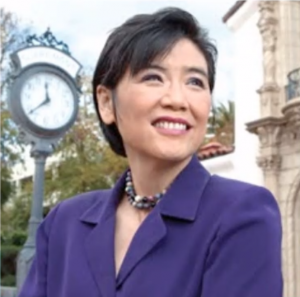45 U.S. Representatives to Duterte: Rescind anti-terror law: ‘We are watching’
45 U.S. Representatives to Duterte: Rescind anti-terror law: ‘We are watching’
 By Irish Mae Silvestre
By Irish Mae Silvestre
The Philippine Reporter
Amidst global outcry and criticism, President Rodrigo Duterte’s controversial anti-terror law went into effect on July 18. Signed by the president on July 3, the law allows for the warrantless arrest and detention of suspected terrorists and has been heavily criticized as a law that will allow gross violations of human rights. The law has sparked protests around the world, including protests in cities across Canada.
And representatives in the U.S. are taking note.
On July 15, U.S. Congresswoman Jan Schakowsky (D-IL) held an online press conference announcing the submission of a letter that urged the Philippine president to rescind the law.
“This law comes during a global pandemic, during a time when we’re already witnessing increased attacks on human rights defenders and critics of the Duterte government and his administration and under a climate of impunity,” said Schakowsky. “That’s how he’s operating.”

Rep. Judy Chu (CA)
The letter, initiated by Schakowsky, was signed on by 44 additional U.S. Members of Congress, including Representatives Eliot Engel (D-NY), Alexandria Ocasio-Cortez (D-NY), Ilhan Omar (D-MN), Judy Chu (D-CA) and Jackie Speier (D-CA).
According to a July 18 report by Reuters, the Philippine Embassy in Washington issued a letter to 50 U.S. representatives in response. The letter, dated July 16, stated, “The Philippines remains committed to the protection of civil and political liberties as well as human rights. The Anti-Terrorism Act itself strongly mandates that human rights be absolute and protected at all times.”
Mounting Pressure
Speakers at the event included U.S. Congresswoman Judy Chu, Former Philippine Congressman Neri Colmenares and Nicanora Montenegro from the San Diego chapter of the Malaya Movement, an organization protesting human rights abuses in the Philippines under Duterte’s rule.
Colmenares said that while it’s important to call for the repeal of the anti-terror law, he stated that there needs to be a focus on the Philippine Human Rights Act (PHRA) that calls for the suspension of military aid and security assistance to put pressure on the Duterte administration.
“I’m sure not a single American taxpayer would like to spend a single American dollar to buy bullets and guns to kill the Filipino people,” he said.
Colmenares added that the law allows the government to charge people simply based on intention.
“It’s any act that seriously interferes with the critical infrastructures, for example transportation – they can also arrest protesters because you seriously interfere with traffic or the transportation for that matter,” he said. “It doesn’t penalize criminal act; in fact, it penalizes intention.”
Likewise, Montenegro said that under this law, any form of dissent and criticism can be seen “as an act of terrorism”, while the real threat comes from Malacañang.
“We must remember even if we’re American citizens we should be concerned with what’s going on not just in the Philippines but in other countries,” she said. “Pain in one is pain for everybody.”
Having seen the effects of Duterte’s violent rule, Congresswoman Chu said that she immediately signed up when she heard about Schakowsky’s letter. Chu was instrumental in the safe return of Brandon Lee, an activist and volunteer paralegal who worked on behalf of Filipino farmers and indigenous populations. Last year, he was shot three times but survived what’s believed to be an assassination attempt connected to the Philippine government.
“Why [is the letter] so important?” asked Chu. “It tells the government of the Philippines that we are watching. We see the targeted killings of labour rights activists. We see the silencing of the Rappler, a media outlet that’s been instrumental in exposing this government. We see the ongoing attacks on any who dare to speak out against Duterte’s violence and the trampling of rights. And we are telling them, these egregious attacks on human rights cannot stand.”
Excerpt from the letter of Philippine Ambassador to the United States Jose Manuel G. Romualdez to 50 U.S. Congress Representatives dated July 16, 2020, in response to the latter’s letter dated July 15, 2020:
“The Anti-Terrorism Act expressly excludes legitimate exercises of the freedom of expression and to peaceably assembly, including engaging in advocacy, protest, dissent, mass action and other similar exercises that are not intended to cause death or serious physical harm to a person, to endanger a person’s life, or to create a serious risk to public safety. The law also provides significant safeguards to prevent abuses in, for example, the detention of persons without warrant. Its prescribed period on warrantless detention is also not materially dissimilar from the anti-terrorism laws of other countries, including those in the West. Importantly, the power of determining with finality who are to be regarded as terrorists resides with the judicial system through proscription.”
Comments (0)